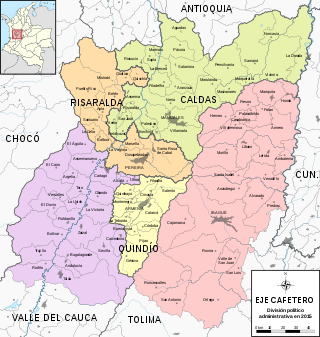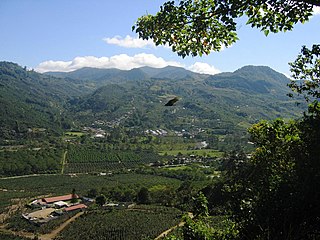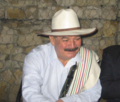
Luis Mariano Ospina Pérez, commonly known as Mariano Ospina Pérez, was a Colombian politician and a member of the Colombian Conservative Party. He served as the 17th President of Colombia between 1946 and 1950.

DDB Worldwide Communications Group LLC, known internationally as DDB, is a worldwide marketing communications network. It is owned by Omnicom Group, one of the world's largest advertising holding companies. The international advertising networks Doyle Dane Bernbach and Needham Harper merged their worldwide agency operations to become DDB Needham in 1986. At that same time the owners of Doyle Dane Bernbach, Needham Harper and BBDO merged their shareholdings to form the US listed holding company Omnicom. In 1996, DDB Needham became known as DDB Worldwide.

Ramiro L. Colón (1904–1983), was the general manager of the Cooperativa de Cafeteros de Puerto Rico. He reorganized the company during its time of crisis and is credited with having saved the coffee industry in Puerto Rico.

The National Federation of Coffee Growers of Colombia,, abbreviated as Colombian Coffee Growers Federation or Fedecafé, is a non-profit business organization, popularly known for its "Juan Valdez" marketing campaign. The Federation was founded in 1927 as a business association that promotes production and exportation of Colombian coffee. It currently represents over 540,000 producers, most of whom are small family owned farms.
Juan is a given name, the Spanish and Manx versions of John. The name is of Hebrew origin and has the meaning "God has been gracious." It is very common in Spain and in other Spanish-speaking countries around the world and in the Philippines, and also in the Isle of Man. The name is becoming popular around the world and can be pronounced differently according that region. In Spanish, the diminutive form is Juanito, with feminine form Juana, and feminine diminutive Juanita.

The Colombian coffee region, also known as the Coffee Triangle is a part of the Paisa region in the rural area of Colombia. It is famous for growing and producing the majority of Colombian coffee. There are four departments in the area: Caldas, Quindío, Risaralda and Tolima. The most visited cities are Manizales, Armenia, Pereira, and Ibagué.

Parque del Café is a theme park in the department of Quindío, Colombia, 4 km south-west of the town of Montenegro and 11 km west of the departmental capital city Armenia. The park was founded by the National Federation of Coffee Growers of Colombia and the Departmental Committee of Coffee Growers of Quindío, and opened on 24 February 1995. It consists of two main areas: by the main entrance are the buildings housing the museum and exhibitions detailing the history, culture and process of growing and producing coffee in the region; and in the valley beyond is an amusement park with rides and shows. The two areas are linked by two gondola lifts and a chairlift: it is also possible to walk between the two areas via an ecological trail that passes through a plantation of many varieties of coffee bushes.
Juan Valdez drinks Costa Rican coffee is a slogan, implying that Juan Valdez, a fictional character created by the Federación Nacional de Cafeteros de Colombia (Fedecafé), drinks coffee from Costa Rica. At one time, it was used on bumper stickers in Costa Rica. The slogan prompted a lawsuit for the first time in 2006, when Fedecafé sued Café Britt following a t-shirt dispute.

Carlos José Sánchez Jaramillo was a Colombian actor who portrayed Juan Valdez for over thirty years, from 1969 to 2006. He was originally a coffee farmer from Antioquia, Colombia. He was an artist in Medellín, Colombia.

Coffee production in Colombia has a reputation for producing mild, well-balanced coffee beans. Colombia's average annual coffee production of 11.5 million bags is the third total highest in the world, after Brazil and Vietnam, though highest in terms of the arabica bean. The beans are exported to United States, Germany, France, Japan, and Italy. Most coffee is grown in the Colombian coffee growing axis region, while other regions focus on quality instead of volumes, such as Sierra Nevada de Santa Marta. In 2007, the European Union granted Colombian coffee a protected designation of origin status. In 2011, UNESCO declared the "Coffee Cultural Landscape" of Colombia, a World Heritage site.

An arriero, muleteer, or more informally a muleskinner is a person who transports goods using pack animals, especially mules.
Café de Colombia was a Colombian based professional road bicycle racing Cycling team active from 1983 to 1990. The team was sponsored by the Colombian coffee growers Federación Nacional de Cafeteros de Colombia.

Juan Valdez Café is a multinational coffeehouse chain based in Colombia that specializes in coffee retail. Its purpose is to become a member of the worldwide coffee restaurant business, and promote Colombian coffee. It was created by Colombia's National Federation of Coffee Growers through Procafecol S.A.; the latter being a company established in 2002. It was named after Juan Valdez, a fictional character meant to promote Colombian-grown coffee.

Coffee production has played a key role in Costa Rica's history and continues to be important to the country's economy. In 2006, coffee was Costa Rica's number three export, after being the number one cash crop export for several decades. In 1997, the agriculture sector employed 28 percent of the labor force and comprised 20 percent of Costa Rica's total GNP. Production increased from 158,000 tons in 1988 to 168,000 tons in 1992. The largest growing areas are in the provinces of San José, Alajuela, Heredia, Puntarenas, and Cartago. The coffee is exported to other countries in the world and is also exported to cities in Costa Rica.
Helmut Krone was an art director and is considered to be a pioneer of modern advertising. Krone spent over 30 years at the advertising agency Doyle Dane Bernbach. He was the art director for the popular 1960s campaign for the Volkswagen Beetle, which featured a large unadorned photo of the car with the tiny word "Lemon" underneath it; the series of "When you're only No. 2, you try harder" advertisements for Avis, and the creation of Juan Valdez, who personified Colombian coffee. During his career, Krone won a number of awards and was inducted in both the One Club's Creative Hall of Fame and the Art Directors Hall of Fame. His work has been collected by the Museum of Modern Art and the Smithsonian.
The depiction of Colombia in popular culture, especially the portrayal of Colombian people in film and fiction, has been asserted by Colombian organizations and government to be largely negative and has raised concerns that it reinforces, or even engenders, societal prejudice and discrimination due to association with narco-trafficking, terrorism, illegal immigration and other criminal elements, poverty and welfare. The Colombian government-funded Colombia is Passion advertisement campaign as an attempt to improve Colombia's image abroad, with mixed results hoping for more positive views on Colombia.

Café Rico is a Puerto Rican corporation that manufactures coffee branded by the same name. The company's headquarters are located at Avenida Las Americas/Route 163 and Calle Comercio/Route 133 in Barrio San Antón in the city of Ponce, Puerto Rico. The company used to be called Cooperativa de Cafeteros.

Ospina Coffee was established in Colombia, by Don Mariano Ospina Rodríguez in 1835. Ospina Rodríguez was one of the pioneers of coffee growing in Colombia and in Guatemala.

Gabriel Silva Luján is a Colombian diplomat and political scientist who served as the 33rd and 27th Ambassador of Colombia to the United States. He has also served as Minister of National Defence and as General Manager of the National Federation of Coffee Growers of Colombia.
The 2013 Colombian coffee growers strike was a cessation of activities of the Colombian coffee economic sector, carried out with the realization of different mobilizations in several municipalities of the country, and consequently, the blocking of roads and riots between peasants and the Mobile Anti-Disturbance Squadron (ESMAD). The strike began on 25 February 2013, and on 2 March, despite reaching agreements between the government and the representatives of the coffee growers, the strike continued. Finally, on the 8th of the same month, the parties reached an agreement, through which improvements will be recognized to the exercise of coffee growing, and therefore, the end of the strike.















